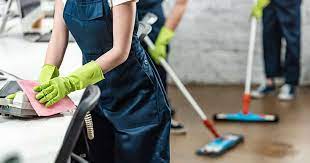Here’s the short answer: Specialised roles in hazardous environments, industrial sectors, or niche commercial cleaning contracts pay the most. These include jobs like crime scene cleaning, offshore rig cleaning, and certain industrial or commercial cleaning positions.
Let’s break it down properly.
1. Crime Scene & Trauma Cleaners
This job isn’t for the faint-hearted. Crime scene cleaners handle everything from biohazard waste to bodily fluids after incidents like accidents, deaths, or violent crimes. Because it’s mentally and emotionally demanding — and governed by strict safety and disposal protocols — it commands high rates.
Typical earnings: $80,000 to $150,000+ per year in Australia, depending on frequency and location.
Why it pays well:
- Biohazard risks and emotional strain
- Required certifications in trauma and chemical handling
- 24/7 availability often required
Anyone who’s worked a 2am call-out after a police cordon knows this isn’t your average mop-and-bucket gig.
2. Industrial Cleaners (e.g. Mining or Oil Rigs)
Working in sectors like mining, oil, and gas means you’re exposed to high-risk environments. These jobs involve cleaning equipment, toxic spills, or dangerous materials, often in remote or offshore areas.
Typical earnings: $90,000 to $180,000 per year (with bonuses and travel allowances).
Perks that boost the pay:
- FIFO (fly-in-fly-out) arrangements
- Hazard pay and insurance benefits
- Work in isolated or extreme conditions (e.g. Pilbara or offshore WA)
It’s gruelling, no doubt. But the pay reflects it. A bloke I met in Karratha told me he cleared six figures in his second year scrubbing slurry pits.
3. Commercial Window Cleaners (High-Rise)
Think scaling Melbourne’s skyscrapers with a harness and a bucket. This job is physically risky and takes serious guts — but the money’s there.
Typical earnings: $60 to $150 per hour, depending on building height and complexity.
Why it’s lucrative:
- High insurance and equipment costs
- Skilled training in rope access and rigging
- Consistent demand in urban centres
Imagine cleaning Eureka Tower’s top floors during a summer wind squall — not everyone’s idea of a relaxing Wednesday.
4. Commercial Cleaning Contracts in High-Demand Suburbs
This is where volume meets margins. In growing commercial hubs like Port Melbourne, cleaners who secure reliable business contracts can scale fast and earn big.
Typical earnings: Varies widely — solo operators might earn $80k/year, while growing outfits can clear $250k+.
Why it pays:
- Long-term contracts = stable cashflow
- Niche verticals (medical centres, data centres) pay more
- Lower marketing costs due to word-of-mouth referrals
This model thrives on the consistency principle — clients who start with you and never leave because you’re reliable and get the job done. In places like Port Melbourne, competition is high, but so is demand.
5. Post-Construction Cleaners
After a major build wraps, someone’s got to come in and deal with the dust, debris, and detritus. Post-construction cleaning is detailed, often rushed (due to handover deadlines), and requires solid gear.
Typical earnings: $35 to $60 per hour; large contracts can reach $100k+ annually.
Key benefits:
- Project-based work = predictable timelines
- Repeat clients in building or development firms
- Little to no night or weekend work
It’s physically intense, but satisfying — you see a filthy site transform into a liveable space overnight.
What factors impact cleaning job salaries?
Not all cleaning roles are created equal, and earnings often boil down to:
- Risk level: Biohazards, heights, chemicals, or remote areas pay more.
- Specialisation: Niche skills (like hazmat training) add serious value.
- Location: Jobs in metro areas (e.g. Sydney, Port Melbourne) pay more due to higher living costs and competition.
- Certifications: Holding licences in safety, chemical handling, or access training opens up higher-paying gigs.
And then there’s the good old-fashioned hustle. Some cleaners build teams, win contracts, and grow their own businesses — moving from mops to management.
FAQ
What cleaning jobs don’t require qualifications but still pay well?
Post-construction and commercial cleaning roles often don’t need formal qualifications — just experience, reliability, and some gear.
Are commercial cleaning jobs in Port Melbourne profitable?
Yes, especially for those who land long-term contracts in offices, retail outlets, or industrial spaces. Growth suburbs with ongoing development offer recurring work.
How can I move into high-paying cleaning roles?
Start by specialising. Get certified in areas like trauma cleaning, rope access, or hazmat handling. Then build a reputation — referrals go a long way in this industry.
Some cleaning jobs truly break the stereotype of being “low-paid” work. In the right niche, with the right attitude, they can be physically demanding but financially rewarding careers. Especially in booming areas like commercial cleaning Port Melbourne, where client loyalty and professionalism can turn a modest start into a six-figure business.
In fact, if you’re wondering how to land your first few clients in such a competitive space, this breakdown explains it well.
And for an expert perspective on trauma cleaning standards and earnings, here’s a solid external reference from Safe Work Australia.

